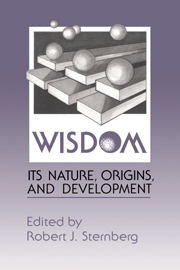Book contents
- Frontmatter
- Contents
- List of contributors
- Preface
- Part I Approaches to the study of wisdom
- Part II Approaches informed by philosophical conceptions of wisdom
- Part III Approaches informed by folk conceptions of wisdom
- Part IV Approaches informed by psychodevelopmental conceptions of wisdom
- 9 The loss of wisdom
- 10 Wisdom and Reflective Judgment: knowing in the face of uncertainty
- 11 Wisdom: the art of problem finding
- 12 An essay on wisdom: toward organismic processes that make it possible
- 13 Conceptualizing wisdom: the primacy of affect–cognition relations
- Part V Integration of approaches and viewpoints
- Name index
- Subject index
10 - Wisdom and Reflective Judgment: knowing in the face of uncertainty
Published online by Cambridge University Press: 05 June 2012
- Frontmatter
- Contents
- List of contributors
- Preface
- Part I Approaches to the study of wisdom
- Part II Approaches informed by philosophical conceptions of wisdom
- Part III Approaches informed by folk conceptions of wisdom
- Part IV Approaches informed by psychodevelopmental conceptions of wisdom
- 9 The loss of wisdom
- 10 Wisdom and Reflective Judgment: knowing in the face of uncertainty
- 11 Wisdom: the art of problem finding
- 12 An essay on wisdom: toward organismic processes that make it possible
- 13 Conceptualizing wisdom: the primacy of affect–cognition relations
- Part V Integration of approaches and viewpoints
- Name index
- Subject index
Summary
In youth and beauty wisdom is rare.
– Chinese fortune cookie, 1988This book attests to the fact that the concept of wisdom has received renewed attention in the legitimate literature of psychology after a long hiatus of being dismissed as an unscientific folk construct. Similarly, after years of neglect, investigators have been exploring the area of adult cognitive development, attempting to describe qualitative differences in the thinking of adults and adolescents or children and to trace and understand their genesis. Researchers such as Fischer and Kenny (1986), Kitchener and King (1981, in press), and Basseches (1986), to name a few, have suggested that the cognitive structures of adults continue to develop and differentiate beyond adolescence in critical ways.
It is the thesis of this chapter that the research on one model of adult cognitive development, the Reflective Judgment model, illuminates the development of many attributes associated with wisdom as well as the relationship between wisdom and intelligence. The model (Kitchener & King, 1981, in press) describes the development of epistemic cognition (Kitchener, 1983), or an individual's knowledge about the limits of knowing, the certainty of knowing, and the criteria for knowing. Further, it describes the developmental relationship between epistemic cognition and good judgment in the face of uncertainty. In other words, the model explicates how individuals move beyond understanding issues that can be known with certainty through the process of logical or formal reasoning to understanding issues of knowing in the face of uncertainty.
- Type
- Chapter
- Information
- WisdomIts Nature, Origins, and Development, pp. 212 - 229Publisher: Cambridge University PressPrint publication year: 1990
- 69
- Cited by



